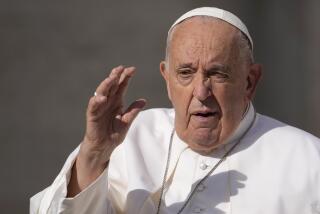Pope Francis apologizes to abuse victims for comments in Chile, still defends controversial bishop

Pope Francis apologized for his assertion in Chile that people who have accused a bishop of covering up the alleged sexual abuse of minors by another priest must provide proof and were guilty of slander. (Jan. 22, 2018)
Reporting from Lima, Peru — Pope Francis has apologized for his highly criticized assertion during a trip to Chile last week that people who have accused a bishop of covering up the alleged sexual abuse of minors by another priest must provide proof.
Francis told the media Thursday that there was no “proof” that Chilean Bishop Juan Barros covered up abuse. The pontiff also suggested that those who have criticized Barros, whom Francis appointed to head the diocese of Osorno in southern Chile, were guilty of slander.
“Here I have to apologize because the word ‘proof’ hurt them, it hurt a lot of abused people,” Francis told reporters late Sunday aboard the papal plane on a flight from Lima to Rome. “I know how much they suffer. And to hear that the pope told them to their face that they need to bring a letter with proof? It’s a slap in the face.”
But the pope also added that he believed Barros was not guilty and that he had no intention of removing him from his post heading the Osorno diocese. Francis appointed Barros to head the Osorno diocese in 2015. Barros had previously served as bishop of the Chilean armed forces.
Widespread criticism of Francis’ comments about Barros tainted Francis’ weeklong trip to Chile and Peru.
To many, Francis’ comments harked back to a historical church tendency to close ranks in support of abusive priests and shift the blame to the victims, who faced the burden of proving their allegations. Church leaders often cited the lack of proof by those alleging clerical abuse, even though gathering such proof was often close to impossible for the traumatized victims of clerical misconduct.
The international fallout from Francis’ comments was so intense that U.S. Cardinal Sean O’Malley, the archbishop of Boston and the pope’s top advisor on clergy sexual abuse, issued a statement Saturday calling Francis’ words a “source of great pain for survivors,” who were left in “discredited exile.”
O’Malley’s words amounted to an extraordinary effort at Vatican damage control, seeking to walk back the words of the leader of the church.
Francis, who has declared a “no-tolerance” policy for clergy sexual abuse, told reporters he was in agreement with O’Malley’s statement.
During his trip to Chile, before his controversial comments on Barros, the pope issued a personal apology to victims of sexual abuse. He expressed remorse about the church’s history of abuse and said he was personally ashamed about the clerical misconduct.
However, his remarks to the Chilean media about Barros quickly became a public relations nightmare that tended to dominate coverage of a papal trip that was focused on a range of social issues — the status of immigrants and the poor, the plight of indigenous groups and the ongoing destruction of the Amazon rain forest. The firestorm about the comments tended to diminish the broader social points that the pope sought to make during his trip to South America.
Despite his apology aboard the papal plane, Francis still insisted that there was not sufficient “evidence” — he used the more legalistic term this time — to condemn Barros or remove him from his post as bishop of Osorno
“I can’t condemn him because I don’t have evidence,” Francis told reporters on the papal plane. “But I’m also convinced that he’s innocent.”
The pope thus implied that the victims who have accused Barros have not convinced Francis that the bishop was involved in a whitewash of sexual misconduct.
Barros has repeatedly denied that he covered up sexual abuse by his onetime mentor, Father Fernando Karadima, a former Santiago priest who became Chile’s most notorious pedophile cleric.
The Vatican sentenced Karadima to a lifetime of penance and prayer in 2011 after finding that he had molested children and adults during his time as a priest in Santiago. Karadima was removed from his ministry but was never prosecuted criminally.
Many victims said the church had ignored for years complaints against Karadima, who was a charismatic figure in his well-off parish in Santiago. Some victims have also said that Karadima’s associates, including Barros, knew about the longtime abuse but failed to take action against Karadima, or covered up his actions.
Special correspondent Jorge Poblete in Santiago, Chile, contributed to this report.
Twitter: @PmcdonnellLAT
More to Read
Sign up for Essential California
The most important California stories and recommendations in your inbox every morning.
You may occasionally receive promotional content from the Los Angeles Times.









